
A rendering showing the proposed Banjo block project in downtown Cedar Rapids. Council members hailed the project’s “wow” factor and its inclusion of a new parking garage. IMAGE SC BODNER
By Dave DeWitte
[email protected]
The $32 million redevelopment of Cedar Rapids’ “Banjo block” is expected to help achieve a critical mass of downtown residents and accelerate redevelopment of surrounding properties, city leaders said in a preliminary review of a big incentive package.
SC Bodner Company, a family-owned multifamily developer based in Indianapolis, is working with the city on plans for a five-story structure with 184 apartments, a 222-space parking garage and a stack of amenities including a courtyard pool, rooftop patio, workout facility and bike shop. The plans surfaced in an incentive package that went to the city council on May 14.
“We really try to find ground-zero locations in our markets,” said Mike Klein, director of development for SC Bodner. He said the company likes the close proximity to the city’s library, Greene Square, museum, and downtown restaurants and attractions, and, through a broker, was able to negotiate a fair price at the high end of the range it was willing to pay.
Redeveloping the one-block site due east of the Cedar Rapids Public Library will require demolition of a mixture of older and largely vacant buildings, including the former Dupaco Community Credit Union and the onetime Banjo Refrigeration building, for which the block has been nicknamed.
SC Bodner is planning to work with local historic preservation organizations to salvage architectural elements of value, and to incorporate elements in the project such as plaques or photos that honor the history of the block.
In exchange for investment guarantees by SC Bodner, the city council authorized a preliminary incentive package proposal including a 100 percent rebate of the tax increment generated by the improvements to the block over 20 years. The incentive is capped at $5.245 million.
Council members were highly supportive of the project, although discussion of the incentive package raised concerns by local apartment owners about the 20-year timeline, which is double the number of years it can be collected under the city’s standard incentive program for such projects.
Apartment owners shared their concerns with Council Member Scott Olson, a commercial real estate specialist who also leads the city’s downtown housing task force, and who is supportive of the project except the high incentive level. He said developers told him that exceeding standard incentives would “open a Pandora’s box” of other apartment developers arguing that they too should get extra tax breaks because of something special about their projects.
Council members coalesced around the incentive package, however, saying there are indeed elements that make it worthy of a higher incentive level.
“The developer is building their own parking garage and not putting pressure on the city,” said Council Member Marty Hoeger.
“If you want projects with a ‘wow’ factor and amenities in a flood zone and a brownfield/greyfield site, there’s a cost,” agreed Council Member Dale Todd. Mayor Brad Hart added that the site involved a high cost of land and demolition.
The project will be the first in Iowa by SC Bodner, a 95-year-old firm that focuses on suburban infill properties in areas of high population and employment growth. The company has developed more than 5,000 market-rate living units in at least nine Midwestern and Southwestern states. SC Bodner uses statistical analysis to identify the most vibrant markets in which to invest, and decided to visit Cedar Rapids through an analysis of some 135 midsized and smaller metro markets in the eastern half of the United States.
“A couple things really attracted us,” Mr. Klein said. “We felt it was perfect timing for a project of the scale and type we’re proposing to kind of take things to the next level. We go to a lot of cities similar to Cedar Rapids, and in visiting with the folks from the city, everyone from [City Manager] Jeff Pomeranz to the Metro Economic Alliance to the Community Development staff were just great. They have it together and they’re all working on the same page.”
Narrowing down the site selection to the Banjo block didn’t take long after a SC Bodner team visited last September.
“When we first came to market we toured the entire market,” Mr. Klein recalled. “We looked in the suburbs and downtown. After the first day with the [real estate] broker, we went in to talk to community development staff and picked their brain. They were going to give us a tour of additional areas and we said, ‘We want to be downtown.’”
SC Bodner liked the pace of new development the city had attracted during its recovery from the flood of 2008, and the design of projects it had brought in. Mr. Klein said the Banjo block project will be at the high end of the market in quality, amenities and price.
About 120 one-bedroom and 50 two-bedroom apartments are planned, along with eight two-bedroom, two-story townhomes. After input from the city council about the need to include more affordable units, he said the company will probably drop plans for six three-bedroom configurations in favor of some efficiency apartments.
Although billed as a mixed-use project, the Banjo block will include only about 1,000 square feet of ground floor retail space.
“Our idea is it’s not a super spot for retail,” Mr. Klein said. “It needs more body heat downtown.”
SC Bodner performs the general contracting, property management and property management for its projects. Mr. Klein said they will be looking for a retail tenant that would meet the immediate needs of Banjo block residents, such as a coffee house, sandwich shop or bicycle shop. CBJ




